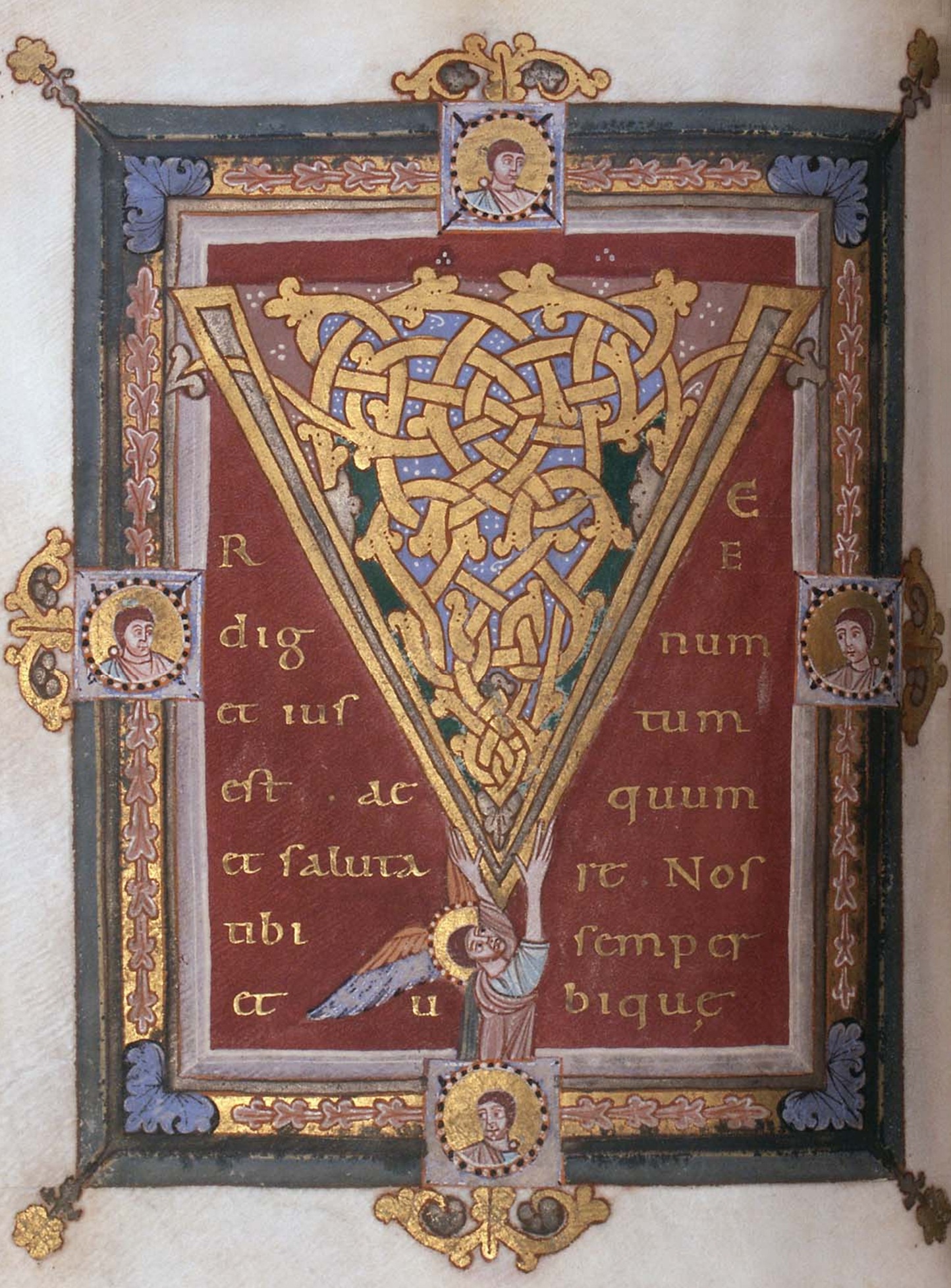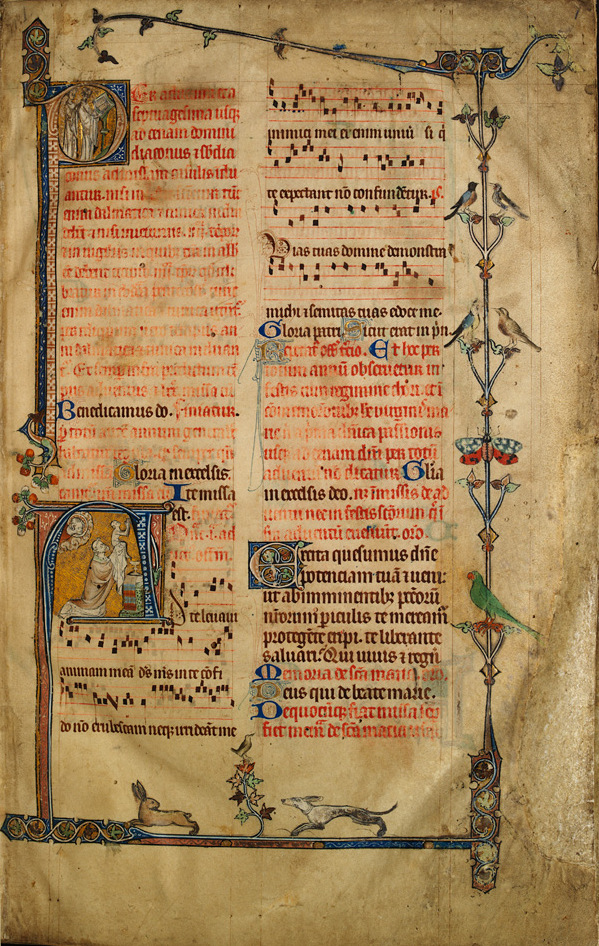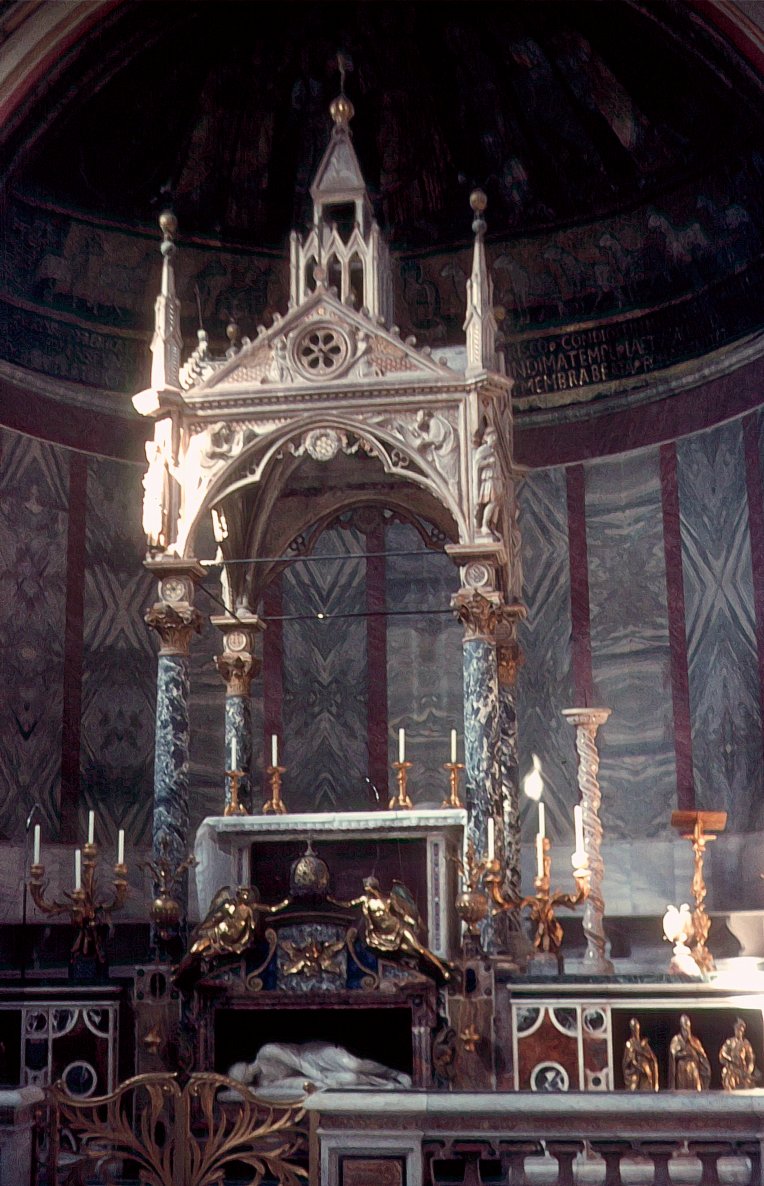|
Sacramentaries
In the Western Church of the Early and High Middle Ages, a sacramentary was a book used for liturgical services and the mass by a bishop or priest. Sacramentaries include only the words spoken or sung by him, unlike the missals of later centuries that include all the texts of the mass whether read by the bishop, priest, or others. Also, sacramentaries, unlike missals, include texts for services other than the mass such as ordinations, the consecration of a church or altar, exorcisms, and blessings, all of which were later included in Pontificals and Rituals instead. In the late 20th century, the word ''sacramentary'' was used in the United States and some other English-speaking countries for the English translation of the Roman Missal, particularly those that, like earlier sacramentaries, omitted parts of the Mass not said by the priest. Decline of the sacramentary Other books used in the celebration of Mass included the Graduale (texts mainly from the Psalms, with musical ... [...More Info...] [...Related Items...] OR: [Wikipedia] [Google] [Baidu] |
Gallican Rite
The Gallican Rite is a historical form of Christian liturgy and other ritual practices in Western Christianity. It is not a single Ritual family, liturgical rite but rather several Latin liturgical rites that developed within the Latin Church, which comprised the majority use of most of Western Christianity for the greater part of the 1st millennium AD. The rites first developed in the early centuries as the Syriac-Greek rites of Early centers of Christianity#Jerusalem, Jerusalem and Early centers of Christianity#Antioch, Antioch and were first translated into Latin in various parts of the Western Roman Empire Praetorian prefecture of Gaul. By the 5th century, it was well established in the Roman diocese, Roman civil diocese of Diocese of Gaul, Gaul, Christianity in Gaul, which had a few early centers of Christianity in the south. Ireland is also known to have had a form of this Gallican Liturgy mixed with Celtic customs. History and origin The Gallican Rite was used from before ... [...More Info...] [...Related Items...] OR: [Wikipedia] [Google] [Baidu] |
Missal
A missal is a liturgical book containing instructions and texts necessary for the celebration of Mass throughout the liturgical year. Versions differ across liturgical tradition, period, and purpose, with some missals intended to enable a priest to celebrate Mass publicly and others for private and lay use. The texts of the most common Eucharistic liturgy in the world, the Catholic Church's Mass of Paul VI of the Roman Rite, are contained in the 1970 edition of the Roman Missal. Missals have also been published for earlier forms of the Roman Rite and other Latin liturgical rites. Other liturgical books typically contain the Eucharistic liturgies of other ritual traditions, but missals exist for the Byzantine Rites, Eastern Orthodox Western Rites, Lutheran and Anglican liturgies. History Before the compilation of such books, several books were used when celebrating Mass. These included the gradual (texts mainly from the Psalms, with musical notes added), the evangelary or g ... [...More Info...] [...Related Items...] OR: [Wikipedia] [Google] [Baidu] |
Pontifical
A pontifical () is a Christian liturgical book containing the liturgies that only a bishop may perform. Among the liturgies are those of the ordinal for the ordination and consecration of deacons, priests, and bishops to Holy Orders. While the '' Roman Pontifical'' and closely related '' Ceremonial of Bishops'' of the Roman Rite are the most common, pontificals exist in other liturgical traditions. History Pontificals in Latin Christianity first developed from sacramentaries by the 8th century. Besides containing the texts of exclusively episcopal liturgies such as the Pontifical High Mass, liturgies that other clergymen could celebrate were also present. The contents varied throughout the Middle Ages, but eventually a pontifical only contained those liturgies a bishop could perform. The ''Pontificale Egberti'', a pontifical that once belonged to and was perhaps authored by Ecgbert of York, is regarded as one of the most notable early pontificals and may be the oldest to s ... [...More Info...] [...Related Items...] OR: [Wikipedia] [Google] [Baidu] |
Missal
A missal is a liturgical book containing instructions and texts necessary for the celebration of Mass throughout the liturgical year. Versions differ across liturgical tradition, period, and purpose, with some missals intended to enable a priest to celebrate Mass publicly and others for private and lay use. The texts of the most common Eucharistic liturgy in the world, the Catholic Church's Mass of Paul VI of the Roman Rite, are contained in the 1970 edition of the Roman Missal. Missals have also been published for earlier forms of the Roman Rite and other Latin liturgical rites. Other liturgical books typically contain the Eucharistic liturgies of other ritual traditions, but missals exist for the Byzantine Rites, Eastern Orthodox Western Rites, Lutheran and Anglican liturgies. History Before the compilation of such books, several books were used when celebrating Mass. These included the gradual (texts mainly from the Psalms, with musical notes added), the evangelary or g ... [...More Info...] [...Related Items...] OR: [Wikipedia] [Google] [Baidu] |
Western Christianity
Western Christianity is one of two subdivisions of Christianity (Eastern Christianity being the other). Western Christianity is composed of the Latin Church and Protestantism, Western Protestantism, together with their offshoots such as the Old Catholic Church, Independent Catholicism and Restorationism. The large majority of the world's 2.3 billion Christians are Western Christians (about 2 billion: 1.2 billion Latin Catholic and 1.17 billion Protestant). One major component, the Latin Church, developed under the bishop of Rome. Out of the Latin Church emerged a wide variety of independent Protestant denominations, including Lutheranism and Anglicanism, starting from the Protestant Reformation in the 16th century, as did Independent Catholicism in the 19th century. Thus, the term "Western Christianity" does not describe a single Communion (Christian), communion or religious denomination but is applied to distinguish all these denominations collectively from Eas ... [...More Info...] [...Related Items...] OR: [Wikipedia] [Google] [Baidu] |
Paul Of Tarsus
Paul, also named Saul of Tarsus, commonly known as Paul the Apostle and Saint Paul, was a Apostles in the New Testament, Christian apostle ( AD) who spread the Ministry of Jesus, teachings of Jesus in the Christianity in the 1st century, first-century world. For his contributions towards the New Testament, he is generally regarded as one of the most important figures of the Apostolic Age, and he also founded Early centers of Christianity, several Christian communities in Asia Minor and Europe from the mid-40s to the mid-50s AD. The main source of information on Paul's life and works is the Acts of the Apostles in the New Testament. Approximately half of its content documents his travels, preaching and miracles. Paul was not one of the Twelve Apostles, and did not know Jesus during his lifetime. According to the Acts, Paul lived as a Pharisees, Pharisee and participated in the Persecution of Christians in the Roman Empire, persecution of early Disciple (Christianity), disciples ... [...More Info...] [...Related Items...] OR: [Wikipedia] [Google] [Baidu] |
Pentecost
Pentecost (also called Whit Sunday, Whitsunday or Whitsun) is a Christianity, Christian holiday which takes place on the 49th day (50th day when inclusive counting is used) after Easter Day, Easter. It commemorates the descent of the Holy Spirit in Christianity, Holy Spirit upon the Apostles in the New Testament, Apostles of Jesus, Mary, mother of Jesus, Mary, and other followers of the Christ, while they were in Jerusalem during the Second Temple Period, Jerusalem celebrating the Feast of Weeks, as described in the Acts of the Apostles (Acts 2:1–31). Pentecost marks the "Birthday of the Church". Pentecost is one of the Great feasts in the Eastern Orthodox Church, a Solemnity in the Roman Rite of the Catholic Church, a Liturgical calendar (Lutheran)#Festivals, Festival in the Lutheranism, Lutheran Churches, and a Principal Feast in the Anglican Communion. Many Christian denominations provide a special liturgy for this holy celebration. Since its date depends on the date of Eas ... [...More Info...] [...Related Items...] OR: [Wikipedia] [Google] [Baidu] |
Pope Leo I
Pope Leo I () ( 391 – 10 November 461), also known as Leo the Great (; ), was Bishop of Rome from 29 September 440 until his death on 10 November 461. He is the first of the three Popes listed in the ''Annuario Pontificio'' with the title "the Great", alongside Popes Gregory I and Nicholas I. Leo was a Roman aristocrat. He is perhaps best known for meeting Attila the Hun in 452 and persuading him to turn back from his invasion of Italy. He is also a Doctor of the Church, most remembered theologically for issuing the Tome of Leo, a document which was a major foundation to the debates of the Council of Chalcedon, the fourth ecumenical council. That meeting dealt primarily with Christology and elucidated the definition of Christ's being as the hypostatic union of two natures, divine and human, united in one person, "with neither confusion nor division". It was followed by a major schism associated with Monophysitism, Miaphysitism and Dyophysitism. He also contributed sig ... [...More Info...] [...Related Items...] OR: [Wikipedia] [Google] [Baidu] |
Roman Rite
The Roman Rite () is the most common ritual family for performing the ecclesiastical services of the Latin Church, the largest of the ''sui iuris'' particular churches that comprise the Catholic Church. The Roman Rite governs Rite (Christianity), rites such as the Roman Mass and the Liturgy of the Hours as well as the manner in which Sacraments of the Catholic Church, sacraments and Blessing in the Catholic Church, blessings are performed. The Roman Rite developed in the Latin language in the city of Rome and, while distinct Latin liturgical rites such as the Ambrosian Rite remain, the Roman Rite has gradually been adopted almost everywhere in the Latin Church. In medieval times there were numerous local variants, even if all of them did not amount to distinct rites, yet uniformity increased as a result of the invention of printing and in obedience to the decrees of the Council of Trent of 1545–1563 (see ''Quo primum''). Several Latin liturgical rites which had survived into th ... [...More Info...] [...Related Items...] OR: [Wikipedia] [Google] [Baidu] |
Book Of The Gospels
A Gospel Book, Evangelion, or Book of the Gospels ( Greek: , ) is a codex or bound volume containing one or more of the four Gospels of the Christian New Testament – normally all four – centering on the life of Jesus of Nazareth and the roots of the Christian faith. The term is also used for a liturgical book, also called the Evangeliary, from which are read the portions of the Gospels used in the Mass and other services, arranged according to the order of the liturgical calendar. Liturgical use in churches of a distinct Gospel book remains normal, often compulsory, in Eastern Christianity, and very common in Roman Catholicism and some parts of Anglicanism and Lutheranism. History In the Middle Ages, the production of copies of the Bible in its entirety was rare because of the huge expense of the parchment required. Individual books or collections of books were produced for specific purposes. From the 4th century Gospel Books were produced for liturgical use, as well a ... [...More Info...] [...Related Items...] OR: [Wikipedia] [Google] [Baidu] |
Lectionary
A lectionary () is a book or listing that contains a collection of scripture readings appointed for Christianity, Christian or Judaism, Jewish worship on a given day or occasion. There are sub-types such as a "gospel lectionary" or evangeliary, and an :wikt:epistolary, epistolary with the readings from the New Testament Epistles. History By the Medieval era the Jewish community had a Weekly Torah portion, standardized schedule of scripture readings from both the Torah and the prophets to be read in the synagogue. A sequential selection was read from the Torah, followed by the "haftarah" – a selection from the prophetic books or historical narratives (e.g. "Judges", "Kings", etc.) closely linked to the selection from the Torah. Jesus may have read a providentially "random" reading when he read from Isaiah 61:1–Isaiah 61:2, 2, as recorded in Luke 4:16–21, when he inaugurated his public ministry. The early Christians adopted the Jewish custom of reading extracts from the Old T ... [...More Info...] [...Related Items...] OR: [Wikipedia] [Google] [Baidu] |








